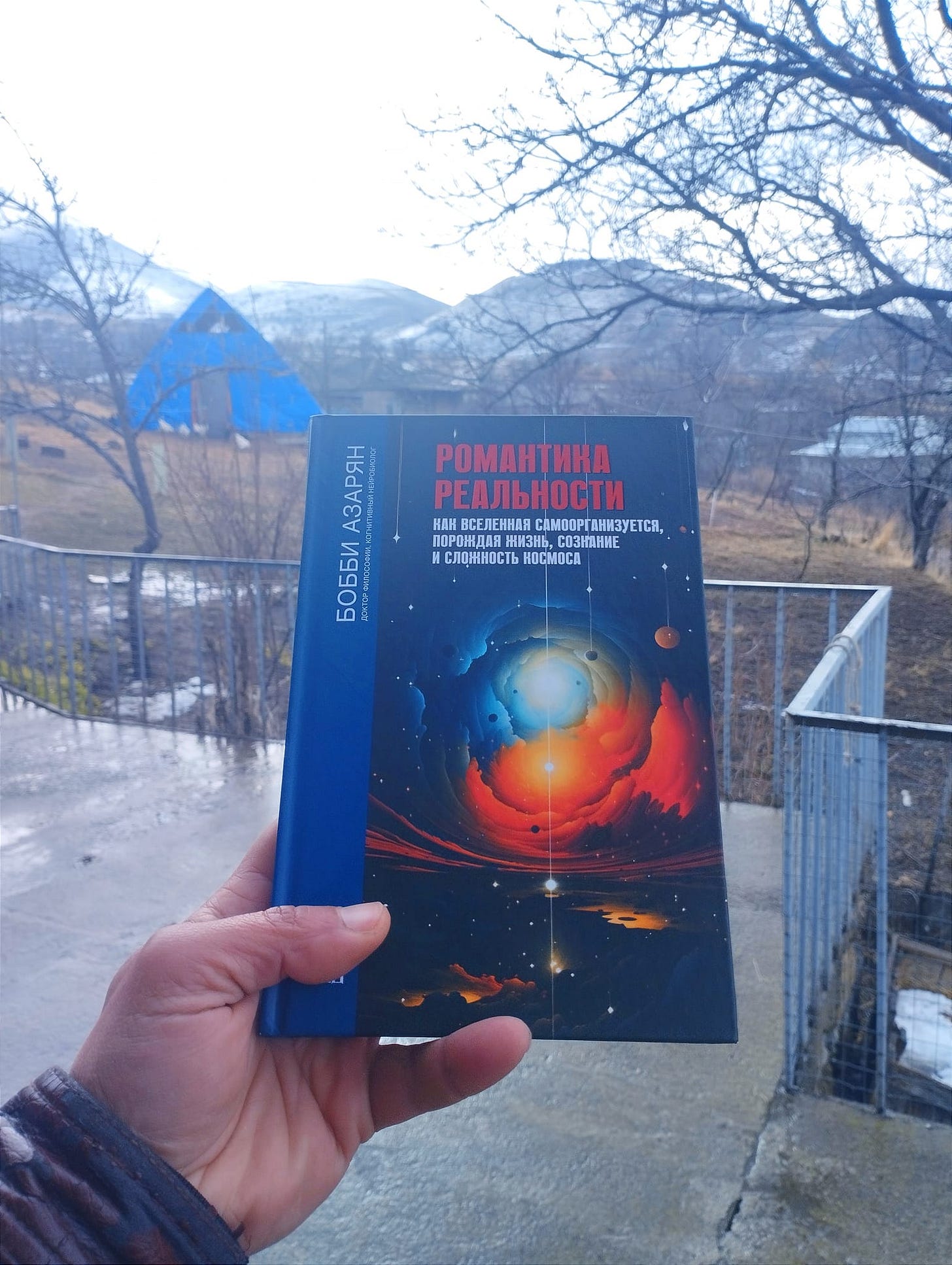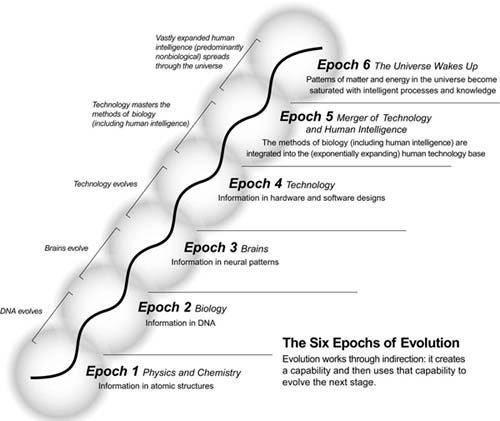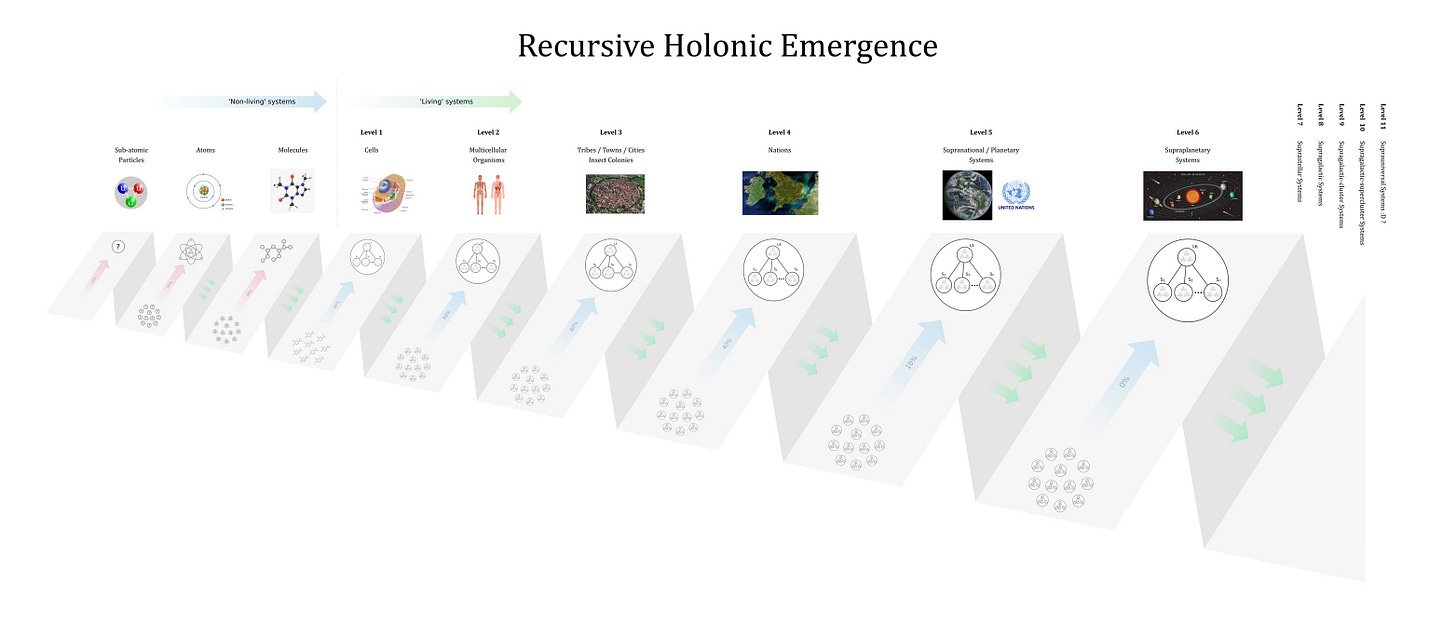Waking Up the Universe: A Teleological Vision for a Meta-Religion
Intelligent life has purpose in a self-organizing universe. This new cosmic narrative offers a basis for a meta-religion that could integrate concepts from theology that are consistent with science.
Today’s post is a deep dive into the science of a self-organizing universe and all of its spiritual implications. Beyond that, I discuss some interesting parallels between concepts from the world’s major religions and the new cosmic narrative emerging from a scientific understanding of recursive emergence — the process of nature’s simplest systems organizing into higher level systems, which then become building blocks for the next level of complexity, in a continual progressive loop of cosmic construction.
Since a striking number of concepts from theology map onto the story of cosmic self-organization, I propose a “meta-religion” that can be built from those religious doctrines that are consistent with the new evolutionary picture of ever-increasing complexity. Rather than throwing the baby out with the bath water, I believe we should use the paradigm of emergence to integrate thousands of years of spiritual philosophy into an empirical worldview that instills life with meaning and purpose.
The first half of the post will be accessible to everyone, while the last half only to paid subscribers, who I am grateful to for the continued support.
But before we get into the fun stuff, a few quick announcements:
It’s official — my next book, tentatively titled A Unifying Theory of Reality: How the Science of Emergence Will Change the World, will be published by BenBella Books in 2025. What can I say about this one? Well, I’m writing it with the mantra “Go big or go home.” The intention is for it serve as something of a manifesto for putting civilization on the path of perpetual progress. It will be less technical, more soulful, and more accessible than my last book.
In other news, The Romance of Reality has been released in Russia and it seems a few other countries where Russian is a major language. This picture comes from someone who got it from a bookstore in Armenia. The cover is pretty damn cool, and I’m not sure who the artist is, but to you I say “Спасибо.”
A couple of weeks ago I did an interview for the super psychedelic podcast Third Eye Drops, which was a ton o’ fun. The discussion is a sneak peak at the topics I will be touching on in my new book, so if you’re curious about that, check it out.
The last bit of news is that I’m giving talk at a conference next month (May 16-19) in Denver called ICON, which will have some relatively big names, like Ken Wilber, the founder of Integral Theory, and Marianne Williamson, a presidential candidate in the last election who participated in the televised debates. She’s also running this time around, so I hope to get to talk to her about Road to Omega and its vision for a political party based on an evolutionary-cybernetic worldview. If you’re in the area, you should come out and say hi.
If you’ve been following this Substack, you probably know that its theme, “Road to Omega,” is based on one big idea, which is that the universe is a self-organizing system that is continually evolving into an increasingly complex state, and that life is not only an inevitable product of this process, but also an accelerator of it (see the Omega Point Theory, which will be discussed below).
In this post, I’ll explain why I think this is the single most powerful idea in history, and why it has the potential to create a unifying worldview that serves the same purpose as religions have served in the past, but without all the baggage.
Scientists generally try to avoid any discussions of spirituality, and I think that is a mistake. It is part of the human condition to seek a connection to something larger than ourselves — something that gives our lives meaning and purpose. I believe that this theory of cosmic evolution does that more than any traditional religion ever could, and for that reason, I will unapologetically present it here in a form that I think highlights its spiritual characteristics.
If this new cosmic narrative is correct, then it completely changes everything we thought that science was telling us about the nature of existence. Rather than being accidental and meaningless, it suggests that sentient life has cosmic significance and an existential purpose. It also suggests that the evolutionary process has an ultimate goal, a point of convergence and grand culmination that is far trippier and mind-melting than anything science fiction or fantasy has dreamt up.
Philosophers describe this vision of the cosmos as “teleological,” and in the past it has been associated with religion because it implies that our universe has a design. However, there is absolutely nothing in this theory that violates any laws of nature or scientific principles. In fact, it helps to explain why we see all the complexity around us, and why human progress appears to occur inevitability and seems to have no limits.
Of course, not everyone agrees with this teleological evolutionary vision — it is widely known that holding this stance became an intellectual faux pas in the 20th century. The idea of inevitable progress was so powerful in the 18th and 19th centuries that there was a major backlash, and some prominent evolutionary theorists, like Ernst Mayr and Stephen Jay Gould, did all they could to kill the idea in academia. You can see the fruits of their ideological efforts in this quote from author Yuval Noah Harari in his best-selling big history book Sapiens: A Brief History of Humankind:
“As far as we can tell from a purely scientific viewpoint, human life has absolutely no meaning. Humans are the outcome of blind evolutionary processes that operate without goal or purpose. Our actions are not part of some divine cosmic plan, and if planet earth were to blow up tomorrow morning, the universe would probably keep going about its business as usual. As far as we can tell at this point, human subjectivity would not be missed. Hence any meaning that people inscribe to their lives is just a delusion.”
It’s interesting that Harari presents this point as fact, when some of the 20th centuries most respected scientists wholeheartedly disagree — among those being theoretical physicist David Deutsch, neuroscientist Christof Koch, complexity theorist Stuart Kauffman, and technologist Ray Kurzweil, just to name a few from a very long list of geniuses with teleological leanings.
But it’s true that complexity growth and social progress don’t happen in a perfectly linear fashion, and that the evolutionary process is “blind” (that is, until humans become aware of their role in the process). Progress occurs through cycles of advancement and collapse, and there are frequent reverses in the trend. It is a constant battle between order and chaos, with advances in technology happening simultaneously as events of great destruction. But that’s exactly how adaptive systems become more resilient. Social systems, for example, are constantly being tested by nature’s hostility, and this exposes weaknesses in the organization of their structure, and then solutions must be invented. This is a process of error-correction and design discovery that strengthens foundations and generates knowledge. The below graph, taken from Ray Kurzweil’s book The Singularity is Near, shows the predictable succession of evolutionary advances, with the time taken to get from one paradigm-shifting event to another decreasing in an exponential fashion. This is the law of accelerating returns in action, and it demonstrates a continuity between biological and technological evolution.
As life emerges and evolves, the inanimate matter in the universe begins to acquire sentience, and free agents are born. Systems are no longer prisoners to the brute forces of nature, and eventually learn to harness those forces with technology capable of what would appear to be great sorcery to primitive humans. As higher intelligence evolves, living beings acquire more freedom of choice and autonomy, but their collective imperative to survive and thrive ensures that they forever carry out the process of knowledge creation, complexity growth, and the conscious awakening of the cosmos.
As life grows from a single cell that is unobservable to the naked eye, into a mature biosphere with a layer of technology sitting on top of it, the entire planet comes to life, and the Earth’s cities shimmer in outer space. At some point, a curious thing happens — rather than being pulled in towards the Earth from space, bodies of matter start being ejected from Earth outward (a phenomenon known as “anti-accretion”), in the form of satellites, and later, human-occupied spacecraft. Does this evolutionary trajectory seem accidental and merely fortunate, or more like the expected developmental path for a self-organizing cosmos of which life is the seed?
Kurzweil obviously believes it’s the latter, and calls the depiction below the “destiny of the universe.” In the remaining two epochs, those that lie in our future, humans merge with our technology, which allows us to spread through the universe and saturate it with intelligent processes and knowledge. This doesn’t happen because we are lucky or clever, but because life — as adaptive complexity — is fundamentally error-correcting, and also because spreading through the universe is a thermodynamic survival imperative (we will always need more energy to maintain life’s ordered state against the tendency toward decay, requiring access to more stars and matter).
In this vision of biology’s outward expansion, what we refer to as “life” can be understood as the universe’s mechanism for encoding self-knowledge and becoming conscious. Rather than being a meaningless and accidental system, the cosmos we inhabit is something like a developing organism, a self-learning computer, and an awakening cosmic mind. Through the evolutionary process and the spread of life, the universe is realizing its creative potential.
It would not be inaccurate to think of the cosmic self-organization process as “building God” — defined in this context as the emergent cosmic mind, which would possess unfathomable creative power — and we may think of humans and any other intelligent agents out there as mini-Gods, as it is the merging of these causal agents into one interconnected computational system that creates the great decentralized mind at a future point in time (Omega). We are primitive versions of this god in the sense that we are intelligent beings with agency and the power to shape the future, and that thought should propel us to make our lives significant in some way, even if the contribution to the process is small.
From this picture of cosmic evolution, which is strictly scientific and based on clear quantitative trends demonstrating the exponential nature of complexity growth and technological progress, we can see that nature is a story of “becoming,” where conscious agents with freedom of choice must battle against the forces of chaos and disorder — external and internal — to bring about a great cosmic destiny. Of course this far-future goal-state might actually just be the beginning of a new chapter that is completely comprehensible to us at this time. We can only speculate as to whether the emergent conscious mind would actually correspond to a cosmic consciousness with a singular subjective experience, or if it would remain a decentralized unconscious intelligence, composed of a cosmic community of differentiated agents with varied interests, beliefs, and behavioral patterns, all working together in harmony.
If the trends of complexity growth and technological progress continue over the course of this century, and the inevitability of life spreading through the cosmos becomes increasingly apparent to us, then I believe this new cosmic narrative will become the world’s reigning “religion,” as science will have shown that an existential philosophy of meaning, purpose, and morality is the correct one. The evolutionary process would have a moral arc, where conscious agents become increasingly spiritual and empathetic as they gain a more sophisticated “theory of mind.” That is, the more we become aware that other agents, human and otherwise, are conscious entities with the capacity for joy and suffering, the more we will care about those agents. The “golden rule” is emergent from a theory of mind and our mirror neuron system. We should treat others as we want to be treated, because such behavior increases the chances that we will be treated well. Morality and utility go hand in hand.
If we can all come to agree on this story of nature, or at least agree that it is the version of the future that makes the most sense to strive for, then we can begin a grand project of reinterpreting all of the world’s religious philosophies through the lens of the “recursive emergence” paradigm. The graphic below, which must be expanded to read (created by James Weir), shows the major levels of emergence, giving us a big history view of the past and a picture of where the process is headed.
What’s interesting about this sci-fi-seeming saga of multi-level self-organization is that philosophers had a vision of such a cosmic process over 200 years ago. The German idealists, Georg Hegel and Friedrich Schelling, both believed that the universe was a self-organizing system that developed through a series of stages that represented the unfolding of reality and the development of consciousness (or ‘spirit’) through the evolution of the human being and civilization. Both were Christians, though their cosmic interpretation of Christianity clashed with the Church’s traditional belief system. I believe these visions of cosmic teleology provide us with spiritual interpretations that could help modernize Christianity and make it consistent with science.
In their epic book 1986 book The Anthropic Cosmological Principle, the cosmologists John Barrow and Frank Tipler interpret Schelling through a computational lens, which puts it in a terminology that is as scientific as it is spiritual:
“In Schelling’s view the Universal Program would give rise to self-conscious subprograms, which would, in the fullness of time, merge together into one self-knowing Mind. Nature is teleological for two reasons: the rational subprograms are presently an image of the Universal Program, and further — as a consequence of being an image of an intrinsically teleological entity — the Universal Program has the goal of universal self-consciousness.”
Keep reading with a 7-day free trial
Subscribe to Road to Omega to keep reading this post and get 7 days of free access to the full post archives.








